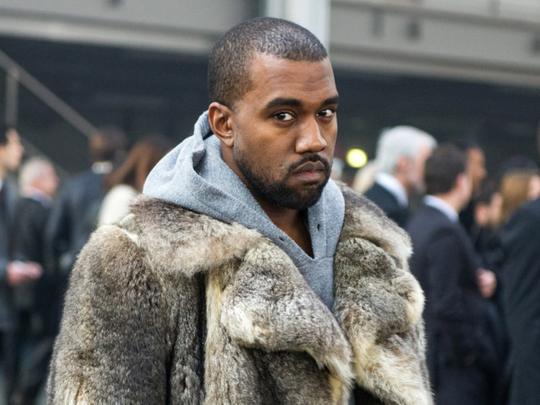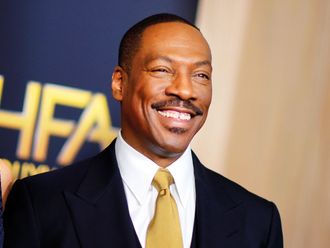
Is Kanye West the most significant musical figure of recent years? Well, he certainly seems to think so. “I’m a creative genius, and there’s no other way to word it,” is one of West’s tamer pronouncements on a subject that has also seen him ranting: “Man, I’m the number one living and breathing rock star! I am Axl Rose! I am Jim Morrison! I am Jimi Hendrix!”
His regular declarations of his own brilliance have become the stuff of satire. But what if he’s right? For many, West is a comical figure, both ringmaster and clown in a gaudy pop circus that only emphasises the superficiality of contemporary celebrity culture. He performs this week in the UK, his first show since his fantastically over-the-top Italian nuptials with socialite and sex-tape star Kim Kardashian, whom West has described as “the most beautiful woman of all time, like, arguably of human existence.”
After a ceremony described in the New York Post as “opulent enough for Florence’s Medici dynasty and tacky enough for reality TV”, fans hoping that West is refreshed and ready for the stage may be concerned by news that the couple spent their honeymoon retouching off-colour flowers on a wedding photo for Kardashian’s Instagram site, a process that apparently took four days and left the bride “exhausted”. West felt vindicated, however, when the picture became the most liked photo in the history of the app, hailing it as “a win for what the mission is, which is raising the palette”.
Never one to stop when he has already said more than enough, West went on to offer to redesign Instagram, which apparently fails to meet his exacting aesthetic standards. It is not alone. “The world as a whole is ---- ugly,” he added.
It is easy to make fun of West as he lurches from absurd proclamation to furious meltdown, courting controversy with every outburst, a modus operandi that makes him either the greatest self-publicist of a self-obsessed age or a hapless victim of his inflated ego and poor impulse control. Or maybe a bit of both. “If I was more complacent and let things slide, my life would be easier, but you all wouldn’t be as entertained,” he has sadly noted. “My misery is your pleasure.”
A sensation
The truth is, whatever West is doing, it’s working. And the bottom line is that none of this would matter without the music. West has been a sensation from the moment he definitively announced himself as a solo artist in 2004 with The College Dropout. Over 10 industrious years, he has written, produced and performed on seven fantastic albums (including his 2011 collaboration with Jay Z, Watch The Throne), sold 21 million albums, 66 million downloads, scored 17 top 10 UK singles and won 21 Grammy awards. And he has done it with a boldness that has continually shifted the musical, lyrical, presentational and even philosophical and moral boundaries of the most prevalent pop genre of our times.
At a time when rap was moving towards a generic, bouncy, clubbing format, West was originally acclaimed for restoring “old school” sampling, concocting tracks from short sound bites of other recordings. From King Crimson to Shirley Bassey to Aphex Twin, the vast and eclectic range of his influences lend him a particularly expressive palette, creating a colourful, multi-dimensional sound incorporating rock, gospel, lounge, soul, funk, Broadway tunes and epic Wagnerian strings. West doesn’t just take a pre-recorded hook and plug it to death, he manipulates multiple apparently incompatible tracks, speeding things up, slowing them down, weaving disparate elements together into constantly shifting and mutating grooves with his own recorded elements, programmed drums, chordal synths and live instrumentation.
His subject matter, too, has been refreshingly wide-ranging, fearlessly addressing any topic that engages his prodigious intellect, from his complex relationship with faith on Jesus Walks to the tragedy of black-on-black crime on Everything I Am. In a genre that has relentlessly romanticised criminality and anti-social behaviour while aggrandising the superficial pleasures of ostentatious consumerism, West has proudly asserted his own middle-class values. His mother was an English professor, his father a photojournalist and Christian counsellor, and West was an A-grade student, attending the American Academy of Art and studying English at Chicago State University before dropping out to pursue his musical ambitions. When he raps about drug dealing, it is not from the perspective of an aspiring hoodlum but from a socio-political observer with a sharp, satirical wit.
“Drug dealer buys Jordans, crackheads buy crack / And the white man gets paid off all of that,” he snaps on the dramatic Crack Music. His intelligence, imagination and daring make even his most blatantly ridiculous nonsense worth paying close attention to (“I’m like a fly Malcolm X: Buy Any Jeans Necessary”). Packed with punning word play and tight multiple rhymes, West’s songs are funny, provocative, articulate (what other rapper would rhyme “sarcophagus” with “oesophagus”?) and capable of shifting seamlessly from astute political comment to comically rampant braggadocio and introverted sensitivity.
West’s most minimalist offering, 808’s And Heartbreak (2008) is the hip-hop equivalent of a break-up album, drawing on Eighties synth pop to sing tremulously about misery, guilt and longing. The rapper can barely hold a note but with the inventive use of Autotune and Vocoder, he transformed himself into a robo-soul crooner on a dark, brooding and genuinely touching set. This kind of brilliance doesn’t come about by accident.
Workaholic
West has a reputation as a competitive workaholic with a hands-on ethic and relentless perfectionism. Fascinated by art, fashion, film, design and technology, he has launched clothing lines, marketed his own shoes, opened chains of restaurants and hinted at extending into different product areas, from water bottles to architecture. “I believe that the world can be saved through design, and everything needs to actually be architected,” he has said, apparently with a straight face.
And if he lacks formal training in any of these disciplines, well, it never held him back in his chosen field. West doesn’t play any instrument or read music. But he is adept in the use of modern computer recording technology and he certainly has an ear for melody and arrangement. His maximalist style reached a peak on his 2010 masterpiece My Beautiful Dark Twisted Fantasy, a flamboyant yet emotionally resonant piece of work that (to quote a five-star Rolling Stone review) “goes for the grandeur of stadium rock, the all-devouring sonics of hip hop, the erotic gloss of disco. All of it, all of the time.”
Yet, West jettisoned all the warmest and most accessible elements for 2013’s Yeezus, delivering a head-spinning blast of digital electro packed with provocative lyrics. Anyone who gets upset by West’s messianism is surely taking pop music too seriously. It is funny, blatantly ridiculous, and, most importantly, it sounds like an absolute monster. Yeezus has a futuristic wallop that will almost certainly be imitated by plenty of other artists on records to come. By then, presumably West will have moved on.
Some critics have questioned West’s sanity, and his pitched mood swings certainly seem to suggest some level of mania. West, typically, sees it differently: “I sit back and see s-- and think ‘Am I the only one that’s not crazy?’?” But since when did we want our pop stars well-balanced? If West reminds me of anyone, it is David Bowie in the Seventies, a decade when Bowie went from impersonating an alien to giving fascist salutes while producing an astonishing body of work that sent ripples far beyond his own rather limited commercial appeal. Decades on, we celebrate Bowie’s visionary achievements at the Victoria and Albert Museum.
I suspect that is exactly the kind of place West would envisage being displayed. So, perhaps it is time to show the world’s most controversial and ground-breaking pop star a little respect.
“They want you to accomplish these great feats, to pull off these David Copperfield-type stunts,” West has noted. “You want me to be great, but you don’t ever want me to say I’m great?”










